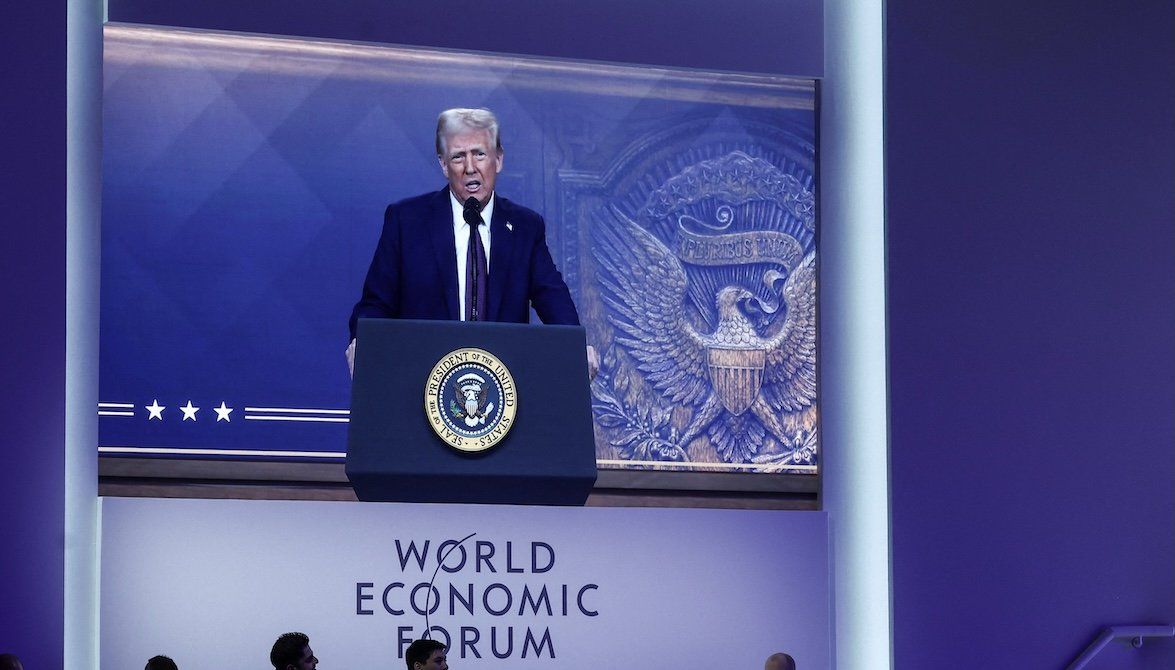GZERO’s very own Tony Maciulis is in the Alps all week to report from the 55th World Economic Forum in Davos, Switzerland.
________
The official theme of this year’s World Economic Forum is “A Call for Collaboration in the Intelligent Age,” but after four days of speeches, panels, off-the-record discussions, and coffee bar chitchat, I’ve decided on my unofficial theme: “Trying to turn anxiety and fear into action.”
Davos participants acknowledge there are so many unknowns right now, and I wouldn’t describe the outlook from European delegates as rosy. Multilateral organizations like the World Health Organization risk losing significant funding, Ukraine waits to see who will stick around as the war approaches a third anniversary, and climate activists wonder if their work over the past decade will melt away like glacial ice.
But, on the flip side, we’ve heard quite a bit of pragmatism on stages that are normally filled with talk of “cooperation” and kumbaya. On Thursday, NATO’s new Secretary General Mark Rutte called for increased defense spending, saying, “Donald Trump is right.” Earlier this week, European Commission President Ursula von der Leyen proposed simplifying regulations and creating an environment where “made-in-Europe innovation and risk-taking thrive.”
As Littlefinger said in “Game of Thrones,” “Chaos is a ladder.” I’m not sure about that, but some here in Davos see this moment as a much-needed push.
A few highlights from Thursday:
1. Trump does Davos by remote: It was easily the most anticipated moment of the week, and it drew the biggest crowd to Congress Hall I’ve seen during this forum. President Donald Trump appeared via live video, delivering a short speech (by Trump standards) followed by a Q&A with financial industry leaders, many of whom were described as “friends.”
In his remarks, Trump called the past few days “a revolution of common sense,” reciting his litany of executive orders that he said would launch “the golden age of America.” In the room, the crowd was quiet and attentive aside from a noticeable laugh or groan in response to Trump’s assertion that the EU has “treated America very unfairly,” and his insistence that Chinese President Xi Jinping called him first to initiate dialogue.
On tariffs, Trump stressed the importance of making products in America where manufacturers would find low taxes. While he didn’t address specifics on tariffs for goods made abroad, he did say they would happen and be in “varying amounts.”
Overall, Trump was tougher on Europe than he was on China, saying he likes President Xi very much, expects a good relationship, and hopes to enlist China’s help in ending the war in Ukraine. Despite campaign claims that he’d end that conflict in 24 hours, he reiterated to the Davos crowd that a ceasefire would take time and depend on Russia but that “Ukraine is ready.”
Børge Brende, WEF president and CEO, thanked Trump for a “powerful speech” and told him he was sure the US president could hear the applause all the way to the White House.
Truthfully, you could barely hear it in the hallway outside the auditorium. But the warm hospitality here in chilly Davos heated up some members of the crowd who became more chatty after the livestream.
2. Milei says he wants to “Make the West Great Again.” Wow. Anyone who heard Argentina’s President Javier Milei left thinking even Donald Trump would tell him to “Simma down nah.” Milei essentially read the Davos crowd to filth, chastising “wokeism” and its evils while praising a posse of leaders with whom he sees himself closely aligned: Italy’s Giorgia Meloni, Hungary’s Viktor Orbán, Israel’s Benjamin Netanyahu, and President Trump, to name a handful.
The speech had it all — an Ayn Rand reference, a condemnation of the Malthusian trap, an attack on “radical feminism,” and, of course, lots of blame for the LGBTQ+ community. “Wokeism is turning Western values upside down,” he said, and then called out the WEF organizers and attendees for being complicit in promulgating woke narratives. Good times. And yes, he ended by repeating his famous, “Long live freedom, dammit!”
3. Meet your new AI co-worker. In a panel conversation on the main stage of Congress Centre, Salesforce CEO Marc Benioff declared that his generation of leaders “will be the last to only manage humans.” He described an army of agents powered by artificial intelligence that will “augment” the human workforce and make their jobs more efficient.
Last year, as WEF began, the International Monetary Fund released a jarring report estimating that up to 40% of jobs globally would be impacted by or lost to AI. This time around, I’m hearing more tempered language. Like Benioff, many leaders are discussing “enhancement” as opposed to replacement, though they’re also stressing the need for skilling and training to prepare workers for their new digital desk mates.
And here’s what we’re watching Friday:
1. A war on science? It probably won’t make headlines, but a morning panel today on science may raise some of the most provocative questions I’ve heard this week. Could growing political polarization and national protectionism make it harder to be a scientist and to find the kind of cross-border collaboration that often leads to faster breakthroughs in research? It was an issue UNESCO’s Gabriela Ramos raised with me during our conversation at the Paris Peace Forum in November.
2. The global economic outlook. In the final hours of WEF, a powerhouse panel will assemble to dissect what these turbulent times mean for growth and stability in the coming months. European Central Bank President Christine Lagarde, IMF Managing Director Kristalina Georgieva, BlackRock CEO Larry Fink, and other moola masters from around the world will talk tariffs, mounting public debt, and market movement in 2025.
3. "Uf Widerluege” from Davos. At noon local time, WEF President and CEO Børge Brende will deliver his closing remarks in the Congress Centre, bringing the 55th annual meeting to a close and sending participants out into the deep uncertainty of this geopolitical moment.
